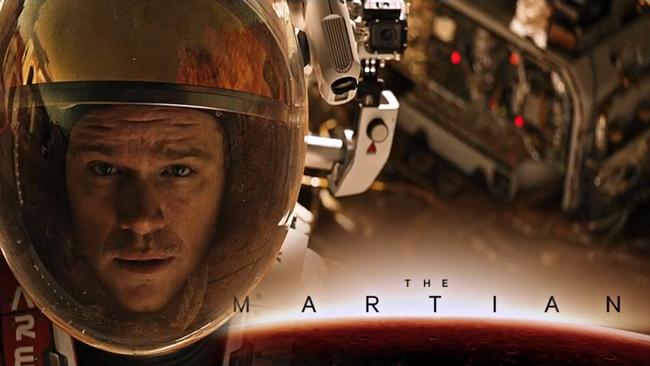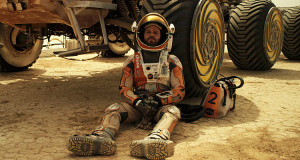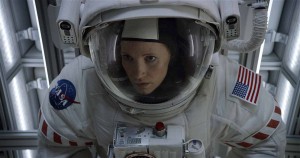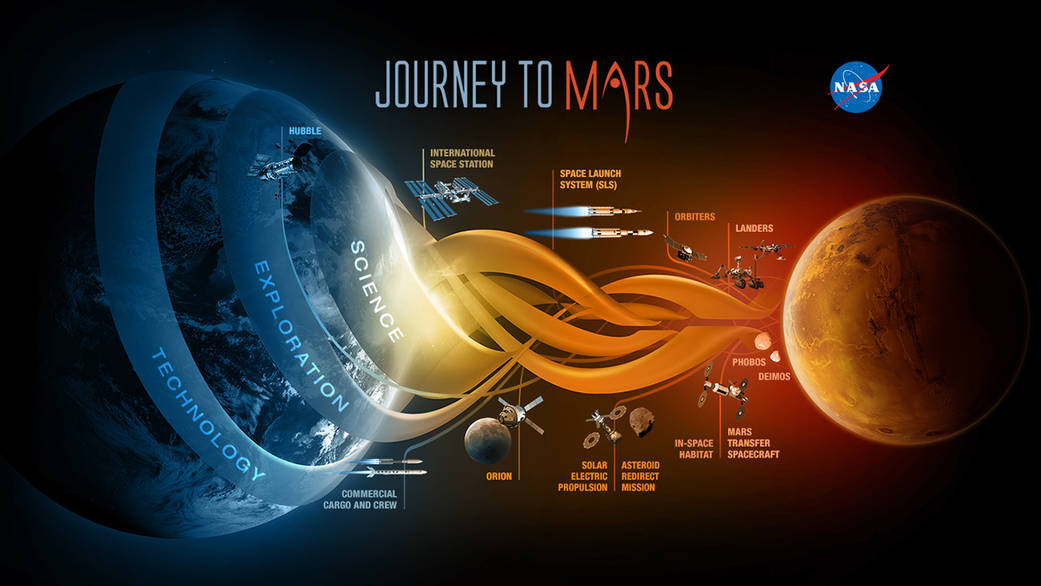
The Martian, is a film adaptation of the inventive, groundbreaking hard sci-fi adventure tale. Like Robinson Crusoe on Mars, it’s a triumph of engineering and basic science, a love letter to innovation and the greatest feats humans are capable of through collaboration. Directed by sci-fi legend Ridley Scott, and following in the footsteps of space epics Gravity and Interstellar, The Martian offers a stunning virtual imagination of Mars, glimpses of NASA’s new frontier – astronauts on Mars – and the stakes of a mission that will soon become a reality. Below, ScriptPhD.com reviews The Martian (an Editor’s Selection) and, with the help of a planetary researcher at The California Science Center, we break down some basics about Mars missions and the planetary science depicted in the film (interactive video).
That the film version of The Martian even exists is a testament to the unlikely success story of Andy Weir’s novel. A self-described science geek and gainfully employed computer programmer, he started writing a novel on the side, self-publishing chapter by chapter on an independent website. Word spread naturally, readers flocked, eventually, a completed book found a publisher and inevitably Hollywood came calling. Sounds about as realistic as… an astronaut being abandoned on a planet and having to make his own way back to Earth. But this is the exact fast-paced, thrilling plot behind one of the biggest hard sci-fi adventures of all time. Amidst an unexpected Martian sand storm, the crew of Ares 3 (the third fictionalized manned mission to Mars) becomes separated and erroneously thinks one of their members, Mark Watney, has died. They scramble to evacuate the red planet, leaving him very much alive with minimal food, water and tools to fend for himself and no communication to speak of.

With chemistry, botany, physics, engineering, home garage junk science and some self-deprecating humor, Watney must protect himself in the harsh Martian setting, figure out a way to let NASA know he’s alive, craft an escape plan, all while managing to overcome one after another devastating setback. At its heart, The Martian is a pure self-reliant survival tale, a staple of popular fiction. Despite its space setting and unapologetically elaborate scientific plot, it’s a story about a really smart guy who is – in the words of one of the many 70s disco songs throughout – stayin’ alive.
The movie adaptation remains mostly faithful to the central plot, necessarily trimming a few of Mark Watney’s perilous side adventures and unnecessarily supplanting Weir’s sardonic dialogue and one liners. The film sometimes lacks the ubiquitous sense of immediate urgency and desperation present throughout the book, but it makes up for it with more polished transitions and the ability to “think big” that is unique to cinema and critical to a science fiction. Most importantly, Matt Damon (as Watney) ably juggles vulnerability, scientific confidence and geek-chic sarcasm of an iconic sci-fi character.

One of the strengths of Weir’s book is the reader’s ability to visualize every detail of the Mars landscape and its phenomena through intricate first-person storytelling. The most important transition from such a detailed book to film is translating that visual realm, from the rolling red Martian plains and hills to the contrast of the confined space shuttle his crew is in to the chaotic flurry of NASA and the Jet Propulsion Laboratory. The vastness of the Martian terrain, incurring both abject loneliness and giddy awe in Watney (with whom we spend the majority of the film) is brilliantly rendered by Scott’s wide angles and grand, sweeping shots. It renders more power to a scene in which the astronaut, unsure if he’ll make it out alive, asks that his parents be told how happy he still is as a scientist, despite everything. “Tell them I love what I do. It’s important. It’s bigger than me.” In that moment, we truly believe him.
For a narrative in which the main character is forced to “science the s—t” out of his predicament, not knowing that back on Earth NASA is doing the very same, one would expect an endless supply of science and technology magic. In that regard, neither the book nor the movie disappoints. But what is truly surprising is the degree of plausibility and accuracy woven throughout the space survival tale. While all recent space films, including Gravity and Interstellar, have been meticulously well researched and inventive, The Martian compounds imagination with incredible scientific reality. For one thing, much of the technology already used by NASA is incorporated into the story. For another, author Andy Weir and director Ridley Scott reaffirmed how hard they worked to get the science right. “Originally The Martian was a serial that I had posted on my website chapter-by-chapter,” said author Weir. “If there were errors in the physics or chemistry problems or whatever, [my readers] would email me. It was great. I got sort of crowd-sourced fact checking. And while some of the science is still not quite air-tight, not only does The Martian take its science very seriously, it managed to thoroughly impress the toughest customer of all – NASA itself!
(For a full Mars primer and breakdown of the planetary science seen in the film, see ScriptPhD.com’s excusive video below.)

With all of the people furiously working to keep Watney alive – the NASA ground crew, Jet Propulsion Laboratory engineers, the Ares 3 crew, and even Watney himself – the real hero and main star of The Martian is science itself. Science facilitates Watney’s survival of the initial Martian storm, allows him to generate food and water to stay alive, traverse the unforgiving landscape and engineer a series of clever technological adaptations to establish communication and series of hopeful escape plans. Most importantly, it allows for an unlikely international alliance to save Watney. “It just goes to show,” [NASA Director] Teddy [Sander] said. “Love of science is universal across all cultures.” This important line from the book is reiterated in the film.
NASA has stated that it aspires to execute a manned mission to Mars by about 2030, a project no doubt buoyed by the exciting revelation that the Curiosity rover has found evidence of flowing water nearby. Expensive, dangerous missions, however, rely on public support for momentum – particularly because NASA research is publicly funded. And movies are often an important cultural gateway to engender and grow such support. NASA advisors of sci-fi film The Europa Report hoped it would inspire a real mission someday. One of ScriptPhD’s favorites from the last few years, Moon, and ambitious sci-fi hit Interstellar have the potential to re-ignite a new space race.

In an exclusive podcast with ScriptPhD.com a few years ago, noted astronomer and science communicator Brian Cox fervently advocated that NASA embrace its greatest challenge to date – manned exploration of Mars: because it’s hard, because we are meant to push the boundaries of the far edges of our galactic frontiers, because space exploration is the greatest universal manifestation of our ability to innovate and engineer. To the extent that The Martian manages to inspire and ignite this idea wih the mainstream public, it will stake claim as more than just a sci-fi benchmark. It will be seen as a catalyst for exploration history. After all, NASA did just announce plans to finally explore life on Jupiter’s moon Europa as depicted in Stanley Kubrik’s classic 2001: A Space Odyssey.
Interested in learning more about all the planetary science that goes into executing a Mars mission? The likelihood of Watney’s survival and some of the technical and scientific feats he pulls off on the red planet? I was privileged to head out to the California Science Center, location of the first ever Viking Mars rover prototype, to break down the science of Mars missions with Devin Waller, a planetary scientist and former Mars researcher.
*****************
ScriptPhD.com covers science and technology in entertainment, media and advertising. Hire our consulting company for creative content development. Follow us on Twitter and Facebook. Subscribe to our podcast on SoundCloud or iTunes.